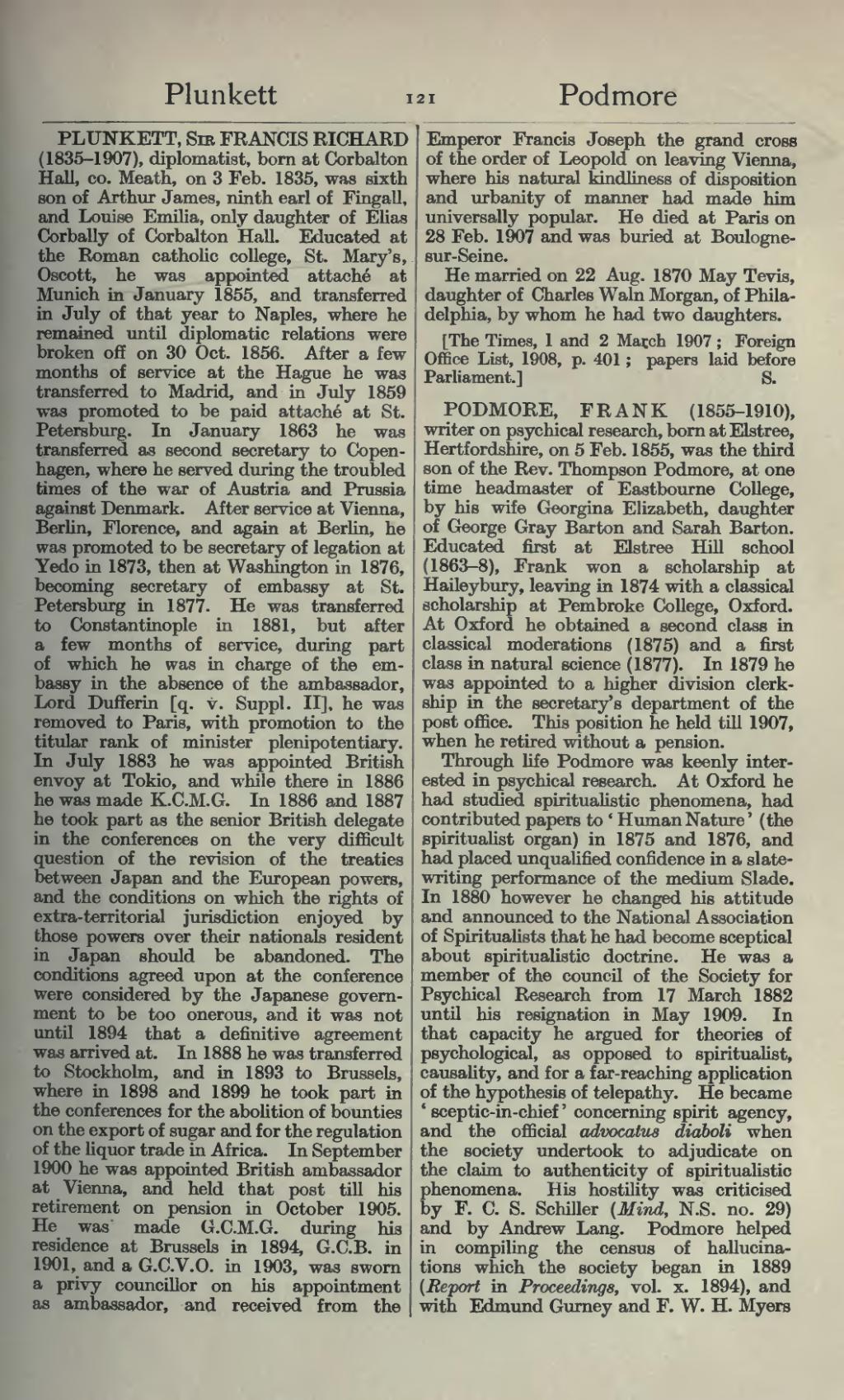PLUNKETT, Sir FRANCIS RICHARD (1835–1907), diplomatist, born at Corbalton Hall, co. Meath, on 3 Feb. 1835, was sixth son of Arthur James, ninth earl of Fingall, and Louise Emilia, only daughter of Elias Corbally of Corbalton Hall. Educated at the Roman catholic college, St. Mary's, Oscott, he was appointed attache at Munich in January 1855, and transferred in July of that year to Naples, where he remained until diplomatic relations were broken off on 30 Oct. 1856. After a few months of service at the Hague he was transferred to Madrid, and in July 1859 was promoted to be paid attache at St. Petersburg. In January 1863 he was transferred as second secretary to Copenhagen, where he served during the troubled times of the war of Austria and Prussia against Denmark. After service at Vienna, Berlin, Florence, and again at Berlin, he was promoted to be secretary of legation at Yedo in 1873, then at Washington in 1876, becoming secretary of embassy at St. Petersburg in 1877. He was transferred to Constantinople in 1881, but after a few months of service, during part of which he was in charge of the embassy in the absence of the ambassador, Lord Dufferin [q. v. Suppl. II]. he was removed to Paris, with promotion to the titular rank of minister plenipotentiary. In July 1883 he was appointed British envoy at Tokio, and while there in 1886 he was made K.C.M.G. In 1886 and 1887 he took part as the senior British delegate in the conferences on the very difficult question of the revision of the treaties between Japan and the European powers, and the conditions on which the rights of extra-territorial jurisdiction enjoyed by those powers over their nationals resident in Japan should be abandoned. The conditions agreed upon at the conference were considered by the Japanese government to be too onerous, and it was not until 1894 that a definitive agreement was arrived at. In 1888 he was transferred to Stockholm, and in 1893 to Brussels, where in 1898 and 1899 he took part in the conferences for the abolition of bounties on the export of sugar and for the regulation of the liquor trade in Africa. In September 1900 he was appointed British ambassador at Vienna, and held that post till his retirement on pension in October 1905. He was made G.C.M.G. during his residence at Brussels in 1894, G.C.B. in 1901, and a G.C.V.O. in 1903, was sworn a privy councillor on his appointment as ambassador, and received from the Emperor Francis Joseph the grand cross of the order of Leopold on leaving Vienna, where his natural kindliness of disposition and urbanity of manner had made him universally popular. He died at Paris on 28 Feb. 1907 and was buried at Boulogne-sur-Seine.
He married on 22 Aug. 1870 May Tevis, daughter of Charles Wain Morgan, of Philadelphia, by whom he had two daughters.
[The Times, 1 and 2 March 1907; Foreign Office List, 1908, p. 401; papers laid before Parliament.]
PODMORE, FRANK (1855–1910), writer on psychical research, born at Elstree, Hertfordshire, on 5 Feb. 1855, was the third son of the Rev. Thompson Podmore, at one time headmaster of Eastbourne College, by his wife Georgina Elizabeth, daughter of George Gray Barton and Sarah Barton. Educated first at Elstree Hill school (1863-8), Frank won a scholarship at Haileybury, leaving in 1874 with a classical scholarship at Pembroke College, Oxford. At Oxford he obtained a second class in classical moderations (1875) and a first class in natural science (1877). In 1879 he was appointed to a higher division clerkship in the secretary's department of the post office. This position he held till 1907, when he retired without a pension.
Through life Podmore was keenly interested in psychical research. At Oxford he had studied spiritualistic phenomena, had contributed papers to 'Human Nature' (the spiritualist organ) in 1875 and 1876, and had placed unqualified confidence in a slate-writing performance of the medium Slade. In 1880 however he changed his attitude and announced to the National Association of Spiritualists that he had become sceptical about spiritualistic doctrine. He was a member of the council of the Society for Psychical Research from 17 March 1882 until his resignation in May 1909. In that capacity he argued for theories of psychological, as opposed to spiritualist, causality, and for a far-reaching application of the hypothesis of telepathy. He became 'sceptic-in-chief' concerning spirit agency, and the official advocatus diaboli when the society undertook to adjudicate on the claim to authenticity of spiritualistic phenomena. His hostility was criticised by F. C. S. Schiller (Mind, N.S. no. 29) and by Andrew Lang. Podmore helped in compiling the census of hallucinations which the society began in 1889 (Report in Proceedings, vol. x. 1894), and with Edmund Gurney and F. W. H. Myers
